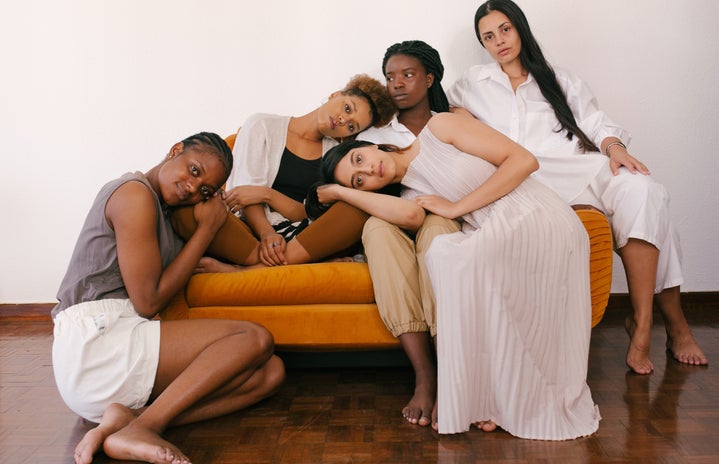Trigger Warning: Sexual Harassment
At the ripe age of 17, I started my first job as a cashier at a bakery. Bright eyed and bushy tailed, I’d station myself at the cash register with a broad smile on my typically stoic face in hopes of accumulating a substantial amount of tips to share with my shift’s team. As a naive teenager, I anticipated the early morning clock-ins at 5 am, the late night clock-outs at 1 am, and the occasional rude customers that made their bad day my problem. I thought my experience would be like A Cinderella Story with Hillary Duff. Poor run-ins with customers wasn’t only something I anticipated, but it was also something that I had glamorized. In my head, I figured that if Duff could dish out snarky remarks to Chad Michael Murray’s catty girlfriend at her diner job, then so could I. However, I wasn’t prepared to deal with the sexual harrassment I experienced, and I didn’t even realize it was problematic until later in life.
To me, co-worker chit-chat was a past-time. But to some of my co-workers, chit-chat was an opportunity to objectify me when I wasn’t in the room and to pursue me romantically despite my lack of interest. As a woman, it’s not a foreign experience to be sexually harassed by strangers or even people you know personally, like co-workers. However, it’s problematic under any and all circumstances.
I felt grateful when a co-worker gifted me a book for Christmas, but that feeling of gratitude quickly turned into a wave of nausea once I saw the love letter written on the front fold of the cover. When another co-worker kept brushing the front of his body against the back of my body every time he passed me behind the counter, that made me sick too. An especially alarming incident that I can recall is when I heard that one of my co-workers had expressed their interest in engaging in sexual activities with me. Since many of my co-workers knew about the incident, but had not expressed any discomfort or disapproval of the comments, neither did I. In retrospect, I should have spoken up for myself and gone directly to management, even if no one else saw a need to do so.

While these incidents barely scratch the surface of the sexual harassment that women have to deal with daily, I include them here because they’re examples of everyday incidents that people brush off as normal. A slew of recent events that should not be brushed off as normal and instead should serve as a wake-up call include: the tragic murder of Sarah Everard, the David Dobrik sexual misconduct allegations, and the publication of the United Nations Survey that found that 97 % of UK women ages 18-24 have been publically sexually harassed.
Shortly after this survey came out, a friend of mine brought it to my attention that his friend didn’t believe the statistic was true because she wasn’t sure she had ever been sexually harassed. This comment piqued my curiousity because it made me question whether she was aware of what exactly constitutes sexual harassment. It seems our society has continually dismissed sexual harassment complaints as inevitable since “boys will be boys,” and as a result, women have become desensitized to inappropriate behavior from men.
So, what is sexual harassment? According to the U.S. Equal Employment Opportunity Commision, sexual harassment is defined as “unwelcome sexual advances, requests for sexual favors, and other verbal or physical harassment of a sexual nature,” as well as “offensive remarks about a person’s sex.” This can range from being catcalled on the street to being coerced into nonconsensual sexual acts on a first date. Other forms of sexual harassment include, but are not limited to, being groped in public, receiving unsolicited and inappropriate pictures or comments online, being given a massage without prior permission, and being brushed against “accidentally.”
But what about the more subtle forms of sexual harassment? What are the more nuanced incidents that women have to deal with as they walk on the street, shuffle into public transportation, enter their places of employment or education, or even live at home? Actions that may seem miniscule and arbitrary for men (often dismissed as a playful joke or display of admiration) can feel deeply upsetting and even life-threatening for a woman. Minor incidents can often escalate into serious and sometimes lethal situations. Women want to feel safe, not like they are trapped in the confines of a meat market every time they encounter a man.

There are countless examples of everyday sexual harassment. Whether it be at the gym or on a street corner, sexual glances where it looks like a man is drooling over a woman are *news flash* never flattering. In fact, those glances just make women want to grip the pepper spray on their keychain even tighter. Other not-so-subtle examples include “coincidental” touching of women’s bodies. When I would swim at my local pool, the middle-aged man there would wait until I did laps to calculate the perfect time to start his own laps and come up for air so his head would collide with my groin. In the workplace, questions about whether I or other female employees have a boyfriend don’t serve any professional purpose. Not only is it inappropriate, but it’s none of anyone’s business. And of course, how could I forget infamous phrases like, “Where’s my hug?” or, “Why are you so serious? You’d be prettier if you smiled more.” Commonplace sexual harassment makes women feel uncomfortable and unsafe, which is why it can’t be overlooked.
Public service announcement to perpetrators of sexual harassment: If a woman is not actively seeking out a hug from you, not smiling at you, and being stand-offish, she’s not interested in you! Women don’t care for your sexual jokes, sexual innuendos, and definitely do not care to be pet-named by you. It is not endearing; it is degrading.
Ideally, perpetrators would change their ways. But unfortunately, sexual harassment, even in its most subtle forms, forces women to adjust their behaviors instead. I decided to wear jeans and baggy hoodies on my hour-long commutes to school and work while I was in high school and still do to this day. I’d rather look like an inconspicuous vagabond than look cute in a dress if it means not being ogled by creepy men on the Metro. Women should not have to base their style on what makes them feel the safest around men. It is time that men take responsibility for their actions, call out their friends for their inappropriate habits of treating women, and try to cultivate an environment where women feel comfortable to just be.
If you or someone you know is struggling with experiences regarding sexual harassment, please reach to the Berkeley PATH to Care Center: Confidential Resources for Sexual Harassment and Sexual Assault Survivors. Their contact information is listed below:
Office: 510-642-1988
E-mail: pathtocare@berkeley.edu
Care Line for 24/7 urgent support: 510-643-2005



